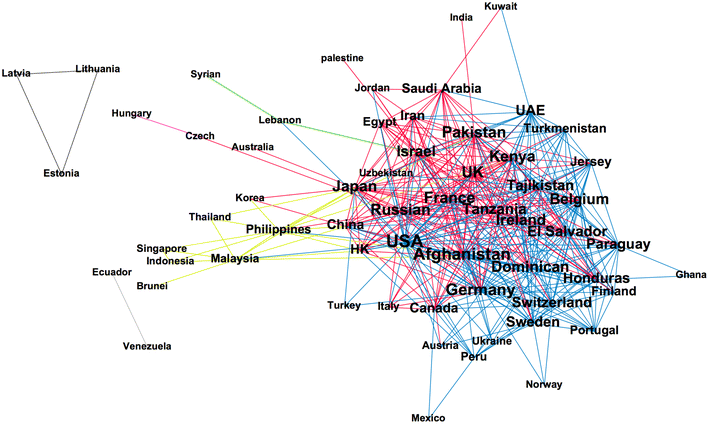Big Data for the United Nations
Work done in and for Latin America with (former) students from the C^2 lab
- UN ECLAC, (United Nations Economic Commission for Latin America and the Caribbean). (2020). Tracking the digital footprint in Latin America and the Caribbean: Lessons learned from using big data to assess the digital economy (Productive Development, Gender Affairs LC/TS.2020/12; Documentos de Proyecto). United Nations ECLAC. https://repositorio.cepal.org/handle/11362/45484
- Hilbert, M., & Lu, K. (2020). The online job market trace in Latin America and the Caribbean (UN ECLAC LC/TS.2020/83; p. 79). United Nations Economic Commission for Latin America and the Caribbean. https://www.cepal.org/en/publications/45892-online-job-market-trace-latin-america-and-caribbean
- Hilbert, M., Khai Bach, J., Bomactao, R., Dou, J., Duong, J., Escobar, J., … Zhang, H. P. (2018). Digital Footprints from Latin America and the Caribbean / Huellas digitales de América Latina y el Caribe (SSRN Scholarly Paper No. ID 3162864). https://papers.ssrn.com/abstract=3162864
Evolution of the worldwide web

This research examines daily data on the use of the world’s 500 most visited websites by 118 countries. We analyze the worldwide website network, based on shared use by country, and the international network, based on joint website use, as well as the two-mode network are analyzed. We ask if the worldwide web is centered about the United States and if there are a series of linguistic and cultural communities? We describe its evolution over time and try to determine the effects of unanticipated shocks (such as the terrorist attacks on Paris) and predictable events (national holidays). This research is part of a Minerva project funded by the Office of Naval Research conducted by Prof. Barnett with Profs. Zeev Maoz and Brandon Kinne from UCD Political Science and Raissa D’Souza from of Computer Science & Mechanical and Aerospace Engineering, along with numerous students and post-doctoral fellows.
Mobile Apps
The mobile phone has become the world’s most pervasive and most widely used communication medium. For many around the world, the mobile phone is even the only communication medium, with 1 billion fixed-line phones worldwide, 2.5 billion TV sets, some 3 billion radios and 3 billion internet users, but over 7 billion mobile phones! And even in the most developed countries like the United States, since 2015 people have started to spend more time on mobile apps than on watching television. 89 % of cellphone owners say they used their phone during the most recent social gathering. What are people doing when they are 'on their phone' all the time? We monitored the complete app usage of 10,728 smartphone users for one month each and collected the digital footprint of 56 million sessions with over 16,000 apps, recording almost 1 million hours of interactivity. Together with our college Prof. Ashwin Aravindakshan, from UCD Graduate School of Management, Prof. Hilbert is leading the elaboration of a taxonomy of mobile apps, which allows to explore communication patterns on mobile apps.
Algorithmification
Algorithms are increasingly taken over what formerly were human decisions. They decide which news we see on social media, 3 out of 4 transactions on U.S. stock markets are executed by automated trading algorithms, they manage our electric grid, and are the match-maker for 1 in 3 marriages in America through online dating sites. Algorithms are essentially procedures, recipes that describe a process. As such, they sometimes even replace entire rules or laws, such as when they are running a metro-station, including trains, which was previously meticulously regulated by laws, which were executed by people. For several semesters how, Prof. Hilbert has been offering CMN 198 "Directed Group Study", in which undergraduate students gain first research experience while exploring the increasing role algorithms play in our daily lives. If you are interested in joining, contact Prof. Hilbert and also consider signing up for CMN 170V "Digital Technology and Social Change".

